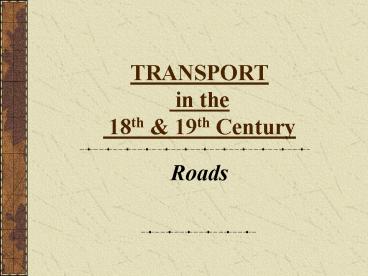TRANSPORT in the 18th PowerPoint PPT Presentation
Title: TRANSPORT in the 18th
1
TRANSPORT in the 18th 19th Century
- Roads
2
Road Transport in the 18th C.
- No-one had built proper roads since Roman times.
- Roads were just muddy dirt tracks which flooded
in winter and formed ruts in summer. - Road travel was very slow, dangerous and
expensive. - Packhorses were used because carts got stuck.
- It was better to take bulky or heavy goods by sea
or by river.
3
The Statute for Mending the Highways 1555
- A law was passed to try to improve the roads.
- It stated that the local villagers had to repair
the roads. - Poorer men had to give up six days labour to work
on the roads unpaid. - Richer villagers were expected to provide
materials.
4
Failure of Statute Labour
- The Parish system of Statute Labour failed
because - - The men were not paid
- They had no skills
- They resented the job
- The local magistrates did not enforce the law
5
Turnpike Trusts
- These were businesses set up by local landowners
and factory owners. - The Trust applied to Parliament for permission to
take over a stretch of road. - A Turnpike Act gave the Trust the right to put up
a toll gate and charge travellers to use their
stretch of road. - A Toll Keeper was employed and lived in a Toll
House next to the Toll Gate
6
Advantages and Disadvantages of Turnpikes
- Advantages
- Hundreds of miles of good roads were built
- Most towns were connected by good roads
- Road vehicles improved
- Stage coach and Mail services started up
- News, business, money, produce and industrial
goods could go by road, helping the Industrial
and Agricultural Revolutions - There was work for engineers, toll keepers, Inns
and coaches..
- Disadvantages
- Turnpikes were expensive to use
- They were on average only 10 miles long
- Lots of stops to pay tolls
- There was no national system
- It took decades to complete the routes
- They were unpopular with local people who
sometimes attacked them
7
The Great EngineersThomas Telford1757-1834
- Built his roads like the Romans with big
foundations - Cambered his roads and ensured good drainage
- Famous for the London to Holyhead road and the
Menai Suspension Bridge - BUT his roads were expensive to build
- Also famous for canals
8
John Loudon Macadam1756-1836
- The most important road builder
- Much cheaper method made him popular with
Turnpike Trusts - Did not use large foundations like Telford
- Ensured the ground was firm and well drained
- Then built smooth, cambered surface
- To this day a good road is said to be
Macadamised
9
Cross-section of Telford and McAdam Roads
10
Other Famous Road Builders
- Blind Jack Metcalfe (of Knaresborough)
- Built roads in North of England
- Used camber and drainage
- Famous for intuition e.g. felt old Roman road
under ground! - Famous for innovative use of local materials e.g.
used heather to help drainage.
- General George Wade
- Built military roads into the Scottish Highlands
- Roads built in 1720s
- Roads built to allow army access to the remote
Highlands where rebel Jacobite clans could hide - These clans had risen in rebellion in 1715
- Wades road helped to suppress them

